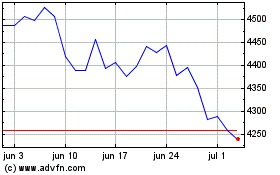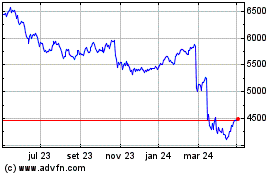Lysol Maker's Shine Will Fade, Not Disappear--Heard on the Street
24 Fevereiro 2021 - 11:58AM
Dow Jones News
By Carol Ryan
The British company behind Lysol and other disinfectant brands
was a clear pandemic winner. Investors have little confidence that
last year's sales boom will stick, which seems overly
pessimistic.
Reckitt Benckiser, which also owns health-oriented brands such
as Durex condoms and Mucinex cold remedies, said Wednesday that
sales increased by an unprecedented 11.8% last year compared with
2019, stripping out the impact of portfolio changes and exchange
rate moves. Operating margins fell while the company invested
heavily in research and development, improved its supply chain and
expanded into new markets -- bringing its disinfectant brands to
Brazil and Turkey, for example.
Shareholders seem to think the best is over. The company's
guidance that sales will grow by just 0% to 2% in 2021 hasn't
helped. Reckitt's share price is back at pre-Covid levels, having
fallen roughly 25% from its pandemic peak last summer. As a
multiple of next year's earnings, the stock trades at 18.7 times.
That is cheap for a consumer staples company -- though peers such
as Unilever have also underperformed in recent weeks as investors
become more focused on economic recovery.
Even if demand for cleaning products ebbs, a portfolio shake-up
is under way to root out losing brands. Reckitt has put its Chinese
infant nutrition business under review. It is an admission that the
previous management team's $17 billion purchase of Mead Johnson in
2017 -- an expensive bet on the Chinese baby food market -- has
soured.
Reckitt isn't the only foreign baby-food manufacturer struggling
in China. Local competitor Feihe is taking market share from Nestlé
and Danone too, and China's birthrate plummeted by 15% last year,
according to official statistics. Reckitt also said Wednesday that
it has sold its Scholl footcare brand for an undisclosed amount.
Together, these two weak businesses contributed around 8% of
Reckitt's sales.
If the pandemic makes consumers more germ-conscious long-term,
which seems feasible, management thinks that its hygiene brands
should grow by up to 5% a year, rather than the 4% rate seen before
the health crisis. New lines of business were added in 2020:
Reckitt has been signing deals with airlines like British Airways
and the Hilton hotel chain to reassure consumers that certain
cleaning protocols are being met. These contracts will contribute
1% to sales growth in 2021, Reckitt estimates.
Last year's sky-high demand for products like Lysol was never
sustainable. Still, Reckitt Benckiser should come out of the crisis
more polished than it is getting credit for.
Write to Carol Ryan at carol.ryan@wsj.com
(END) Dow Jones Newswires
February 24, 2021 09:43 ET (14:43 GMT)
Copyright (c) 2021 Dow Jones & Company, Inc.
Reckitt Benckiser (LSE:RKT)
Gráfico Histórico do Ativo
De Mar 2024 até Abr 2024

Reckitt Benckiser (LSE:RKT)
Gráfico Histórico do Ativo
De Abr 2023 até Abr 2024
